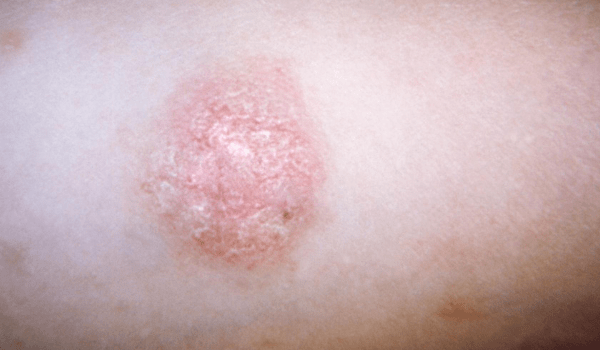You may have heard of pityriasis rosea and you may have heard of a herald patch, but did you know the two are connected? Pityriasis rosea is a common skin disease that results in a rash. A herald patch, also called a mother patch, is the first sign of pityriasis rosea.
What is The Herald Patch Stage of Pityriasis Rosea?
The herald patch will be the only patch to appear for approximately two weeks. It can range in size from small to large (up to four inches) and is typically scaly. On fair to olive-toned skin, the herald patch may appear pink or rose-colored. On darker skin tones, a herald patch may appear violet to dark gray.
How Long Does it Take For a Herald Patch to Go Away?
The herald patch and daughter patches can last up to 10 weeks. Those most likely to get pityriasis rosea are between the ages of 10 and 35, and it is more likely to occur during pregnancy.
Is a Herald Patch Contagious?
While a herald patch and daughter patch may look unpleasant, they are not known to be contagious. Dark spots may occur once the patches have faded, but these spots will fade eventually.
Can a Herald Patch Look Like Ringworm?
Pityriasis rosea can be mistaken for ringworm or eczema. Good news though, if you experience pityriasis rosea, it is very unlikely you will ever have this condition occur again. It is best to see a dermatologist if you notice patches similar to a herald patch or daughter patches to obtain the correct diagnosis.
What Are Daughter Patches?
Within one to two weeks of a herald patch appearing, daughter patches will begin to appear. Unlike a herald patch, daughter patches are smaller in size and are oval shaped. Daughter patches can appear over large areas of the body, including the chest, abdomen, and back. Daughter patches can also occur inside the mouth. If multiple daughter patches appear on the back, they may form the shape of a Christmas tree. Patches rarely appear on the face, scalp, palms, or soles, but may appear on the neck. While rare, some people only experience a herald patch, while others only experience daughter patches.
What Worsens Pityriasis Rosea?
In addition to the herald patch and daughter patches, about 50% of people diagnosed with pityriasis rosea also deal with itching of the skin, especially in the area of the patches. Working out or hot showers warm the skin and may cause the itchiness to worsen.
What Causes Pityriasis Rosea Herald Patch?
While fungi, allergies, and bacteria are known not to cause pityriasis rosea, some evidence suggests that a virus may be to blame. However, there is no clear evidence that points to a specific cause for pityriasis rosea.
Preparing For Your Appointment
Being prepared for your appointment with the dermatologist can help you get the most out of visit. Before arriving for your appointment, create a list of symptoms that you have been experiencing. In this list, you can include symptoms that you do not feel are related and your dermatologist can determine if they are important to this specific diagnosis. It is also helpful to list any major stressors or life-changing events that have recently occurred. Bring a list of current medications and any questions you may have for your dermatologist.
How is Pityriasis Rosea Diagnosed?
Most dermatologists can diagnose pityriasis rosea by observing the presence of a herald patch along with daughter patches. However, to confirm this diagnosis, the dermatologist may take a small scraping of the skin for testing or prescribe blood work.
How Do You Treat Pityriasis Rosea Herald Patch?
While you may not need treatment for pityriasis rosea, a dermatologist can prescribe a topical cream or antihistamine to reduce itching. You may even receive light treatment to combat itchiness. A dermatologist may even prescribe corticosteroids and anti-viral medications.
If you prefer to combat itching with no medication, your dermatologist may suggest other methods. These include: taking lukewarm showers, avoiding any extensive activity that would cause your skin to warm (cardio exercise), soaking in an oatmeal bath, and applying calamine lotion to the areas affected by a herald patch or daughter patches.
Talk to Your Dermatologist
If you have noticed a herald patch or daughter patches present on your skin, reach out to Vujevich Dermatology Associates to schedule an appointment at one of our three offices.
Vujevich Dermatology Associates offers medical, surgical, and cosmetic dermatology from some of the most highly trained physicians and clinicians in the greater Pittsburgh area. You can reach our team at 412-429-2570 or visit our contact page to see all of our locations. You can also follow us on Facebook to see what’s new in the world of dermatology.

